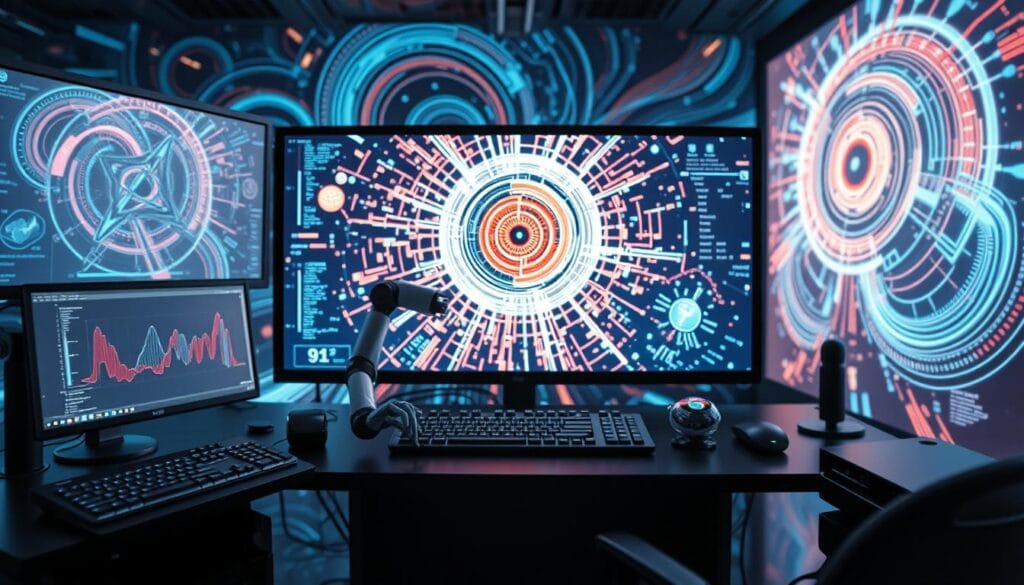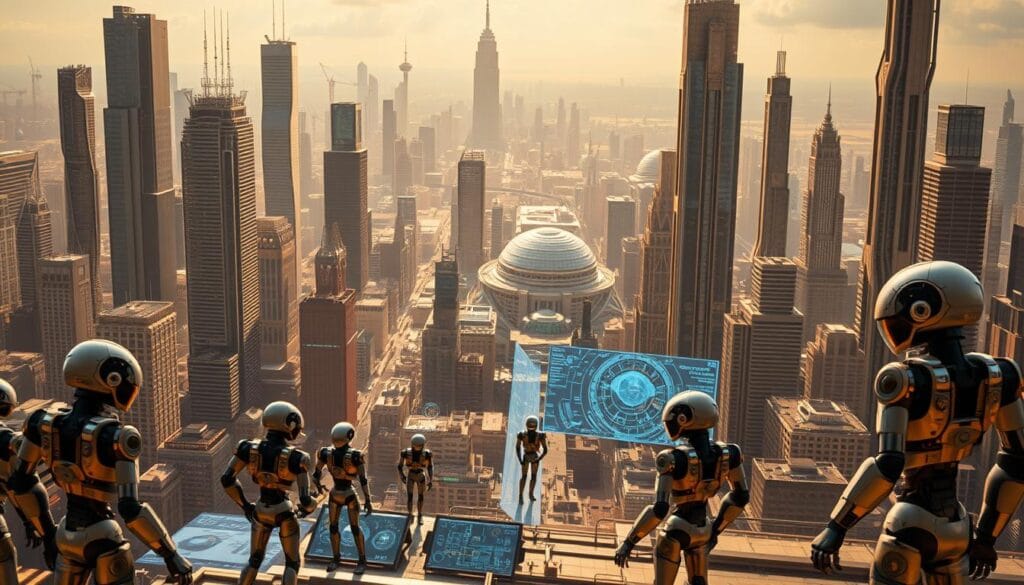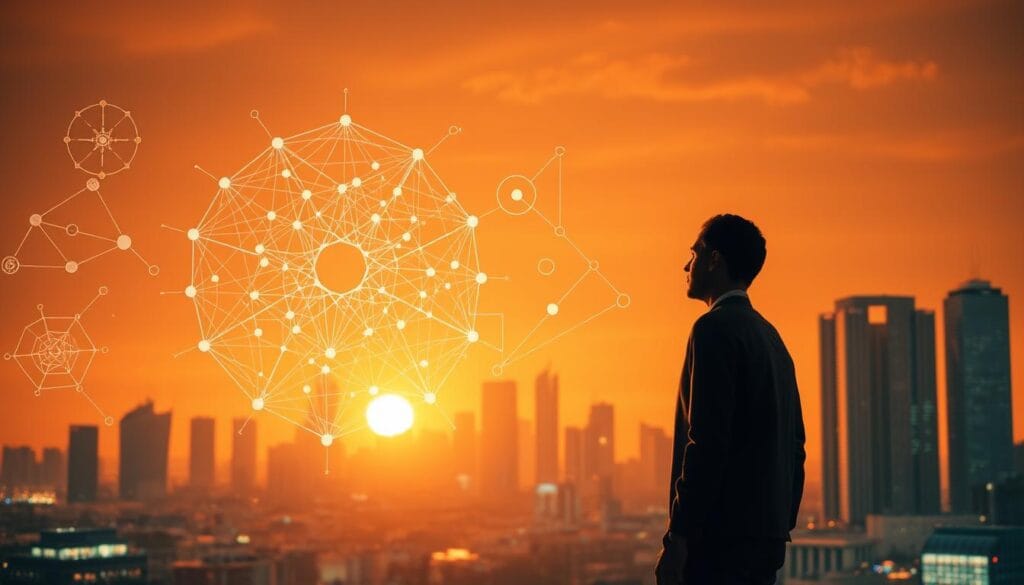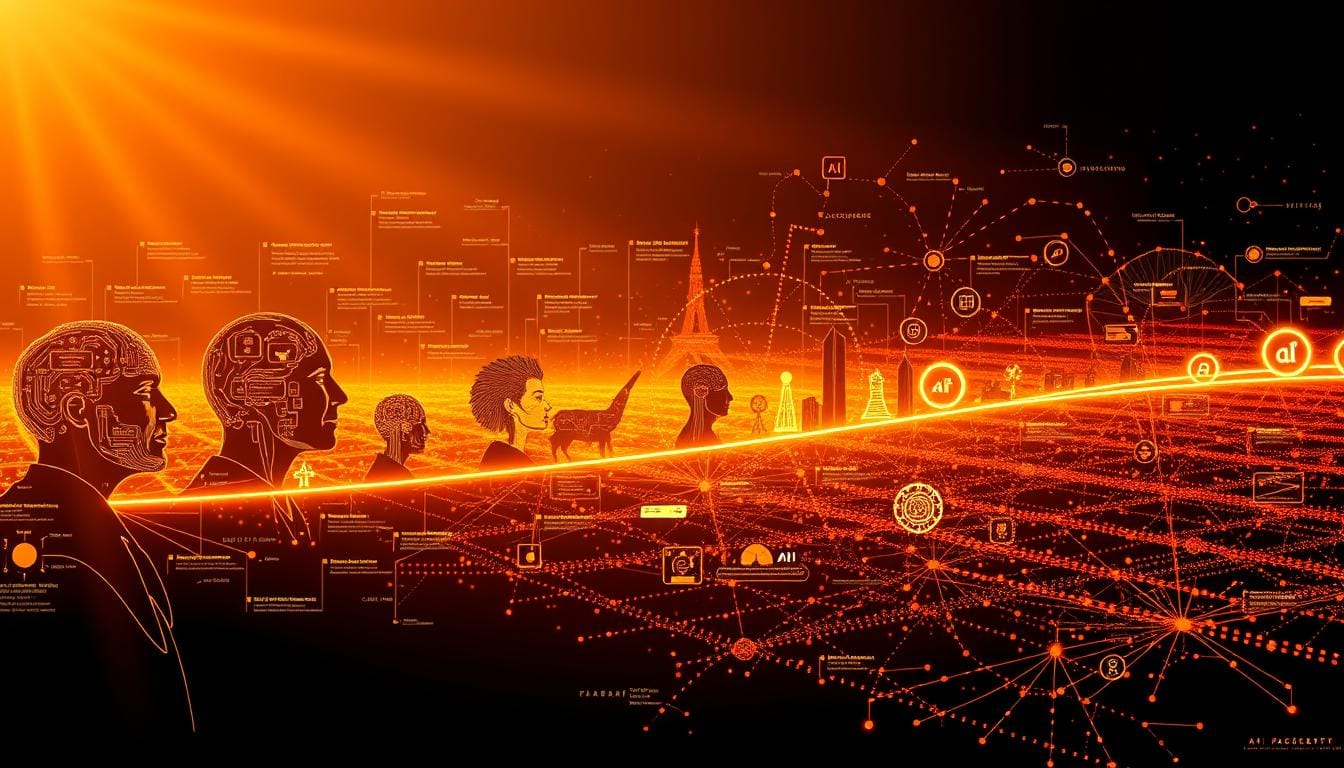Technology has changed fast, thanks to artificial intelligence (AI). This brief history shows how AI went from science fiction to our daily lives quickly. We’ll see how AI has changed our lives and what the future holds.
AI’s growth shows us a world reshaped by this innovation. It’s not just changing; it’s being reinvented.
We’ll look at the key moments that brought AI to where it is today. This journey shows how technology and society interact.
Key Takeaways
- The timeline of artificial intelligence captures significant milestones from its inception.
- AI’s impact on society is profound, influencing various sectors.
- The evolution of technology has fostered rapid AI advancements.
- Understanding AI’s role today is essential for future innovations.
- The future of technology is deeply intertwined with AI development.
Introduction to Artificial Intelligence
Artificial intelligence is more than just a trend. It’s a complex mix of technologies that mimic human thinking. As we explore the introduction to AI, we see its many sides. This includes its definition and its wide range of uses.
So, what is artificial intelligence? Simply put, AI are systems that can do things that humans usually do. They can spot patterns, learn from data, and even make choices. The blend of machine learning and deep learning shows how AI basics create smart systems.
AI is changing the world in many ways. It’s key in fields like healthcare and entertainment. Knowing about AI helps us understand the changes it brings to our lives.
The Evolution of Computer Technology
Computing has changed a lot, from early tech to today’s digital devices. The history of computers is filled with key inventions and moments. It’s a story of how we got from simple machines to the tech we use now.
Early Computing Devices
The first computers, like ENIAC and UNIVAC, started it all. They used punch cards and were huge, taking up whole rooms. Yet, they were the start of something big, showing us the power of computers.
Transition to Digital Computers
The shift to digital computers was a big deal. It made computers faster and more precise. With new tech, like transistors, computers got smaller and more powerful. This change led to better algorithms and even artificial intelligence.
The Brief History of Artificial Intelligence: The World Has Changed Fast — What
The start of artificial intelligence is a story of early innovators’ dreams. It began in the mid-20th century, thanks to pioneers like Claude Shannon. His robotic mouse, “Theseus,” in 1950 was a first try at teaching machines to learn.
This project showed how machines could solve problems like humans. It mixed computer science with brain-like thinking in a groundbreaking way.
Initial Attempts at AI Development
Back then, AI research focused on making machines think like us. They worked on symbolic reasoning and simple neural networks. The goal was to mimic human thinking.
These early efforts included:
- Creating basic algorithms for information processing.
- Trying to make machines think logically.
- Exploring how to solve problems like humans do.
Notable Early AI Systems
Soon, many early AI systems were developed. They used new methods that shaped AI’s future. Some key examples are:
| System/Project | Year | Description |
|---|---|---|
| Logic Theorist | 1955 | Created by Allen Newell and Herbert A. Simon, it proved mathematical theorems. |
| Programmed to Play Chess | 1956 | An early use of AI in strategy games, showing tactical thinking. |
| ELIZA | 1966 | A program that talked like a human, starting the journey to conversational AI. |
The history of AI is a story of constant growth. Early researchers faced big challenges but made great progress. Their work led to the advanced AI systems we see today.
Rapid Advancements in AI Capabilities
The last 20 years have seen huge growth in AI. This is true for AI language and image recognition. What machines could do before is now much better. This shows a big change in what machines can do.
Language and Image Recognition
AI can now understand and create text like humans. It’s used in chatbots and customer service, making things better for users. AI can also look at images and understand them well. This helps in security, healthcare, and social media.
Developments in Machine Learning
Machine learning has driven this progress. New algorithms help AI learn from lots of data. This includes learning from labeled data and finding patterns on its own. This makes AI more flexible and able to learn from different sources.
| AI Capability | Description | Significant Application Areas |
|---|---|---|
| AI Language Recognition | Understanding and generating human language | Customer Service, Virtual Assistants, Content Creation |
| Image Recognition | Identification and interpretation of visual data | Healthcare, Security, Social Media |
| Machine Learning Techniques | Supervised and unsupervised learning methods | Data Analytics, Fraud Detection, Personalized Marketing |
AI in Daily Life Today
Artificial Intelligence is now a big part of our daily lives. It changes many areas like transportation, finance, and recruitment. This change makes things more efficient but also raises important questions about ethics.
We’ll look at how AI affects these fields.
AI in Transportation
AI has changed how we move around cities. Self-driving cars and trucks are making travel safer and faster. Companies like Tesla and Uber use AI to make logistics better.
Traffic systems now use AI to manage traffic better. This means less traffic jams and smoother rides. The future of travel is looking smarter, not just faster.
AI in Financial Decisions
In finance, AI helps analyze huge amounts of data. It shapes investment plans and improves credit scores. AI helps make financial decisions faster and more accurate.
This leads to better risk management and profits. AI takes over tasks that used to need humans, giving us quick and precise insights.
AI in Recruitment Processes
AI makes hiring easier by automating the process. It quickly sorts through resumes and finds the right candidates. Companies use AI to avoid bias and find the best people for the job.
But, using AI in hiring raises big questions about fairness. It’s important to make sure AI is used in a way that’s fair to everyone.
From Image Recognition to Image Generation
The shift from image recognition to image generation is a big leap in technology.
Now, systems can make AI-generated images with amazing detail. They can turn simple text into photorealistic pictures. This has opened new doors in art, advertising, and entertainment.
Digital artists are now using AI to come up with new ideas and visuals. They can even improve their work. This has changed how we think about creativity.
This technology brings many possibilities. For example, it can make learning more fun for students. Businesses can also use it to make their marketing more interesting and unique.

As AI-generated images get better, we must think about how they will change our world. How will we see creativity and originality in the digital age? The answers could change everything.
The Role of AI in Business and Industry
AI has changed how businesses work, making them more efficient and productive. It lets companies automate tasks, cutting down on mistakes and speeding things up. In fields like manufacturing, logistics, and customer service, using AI is now essential.
Tools like chatbots and predictive analytics help manage supply chains and talk to customers better. This makes businesses more flexible and ready to adapt.
Automated Processes and Efficiency
Businesses can now focus on growing and innovating thanks to AI. Automation makes workflows smooth, saves money, and boosts results. Tasks like:
- Data entry and processing
- Inventory management
- Routine customer interactions
lead to quicker decisions and better use of resources. Companies that use AI often see big improvements in their performance.
AI in Marketing Strategies
AI has changed how brands talk to their customers. It uses advanced data to target ads better, making sure they hit the right people. AI-driven ads create personalized content that grabs attention.
- Predictive analytics for forecasting trends
- Content generation tailored to individual preferences
- Real-time monitoring of campaign performance
are key to better digital marketing and higher engagement. Brands use AI to keep their marketing fresh and effective, leading to more sales and a stronger market position.
The Future of AI Technology
Looking ahead, AI is set for a big leap. Experts say we’re getting closer to AI that thinks like humans. This new AI will change how we do things, maybe even how we live.
By 2040, we might see AI that’s almost as smart as us. This is a big deal for technology.
Predictions about Human-like AI
AI getting smarter could mean big changes. Machines might understand us better, even feel emotions. This could make our lives easier and more productive.
But, it also raises questions. Can machines really think like us? Can they learn to interact like humans?
AI's Potential Impact on Society
AI is changing how we live and work. It could make things better, but it also brings new problems. We need to figure out how to use AI for good.
Talking about rules, fairness, and who gets to use AI is key. How we handle these issues will shape our future with AI.

Understanding AI's Dual-Use Nature
Technology keeps getting better, and so does the idea of dual-use technologies. This is very true for artificial intelligence. AI can make healthcare better and supply chains more efficient. But, it also comes with big risks.
Some AI uses can be very harmful. This makes us worry about security and how AI is used ethically.
AI is being used by governments and companies for national security. This shows how AI can be both good and bad. We need to watch these technologies more closely.
People like tech experts, business leaders, and government officials need to talk openly about AI risks and benefits. We should ask hard questions about AI’s bad side effects. It’s important to use AI in a way that’s safe and helps us grow.
| Aspect | Benefits | Risks |
|---|---|---|
| Healthcare | Improved diagnostics and personalized treatment | Potential misuse of medical data |
| Security | Enhanced surveillance and threat detection | Privacy violations and oppression |
| Finance | Automated trading and risk assessment | Market manipulation via AI |
| Transport | Increased safety with autonomous vehicles | Hacking and control of autonomous systems |
Ethical Considerations in AI Development
The rise of artificial intelligence (AI) brings up big questions about ethics. As AI grows, making sure it’s developed responsibly is key. It’s a tough job to balance new ideas with making sure they’re fair and right.
Setting clear rules helps make sure AI helps everyone, not just a few. It keeps our rights and privacy safe.
Balancing Innovation with Responsibility
When it comes to AI, we have to walk a thin line. We need to keep pushing the limits of what’s possible while staying true to our values. This means making sure AI is open and fair for everyone.
By listening to many voices, we can create rules for AI. These rules let us be creative while keeping ethics in mind.
Societal Implications of AI Technology
AI is changing how we live and interact with each other. It’s causing a big change in our society. The AI and societal impact is huge, affecting how we act and what we value.
We need to keep talking about how AI is changing us. This way, we can make sure it benefits everyone, not just a few.

Conclusion
As we wrap up our look at artificial intelligence, it’s clear that AI’s history is both exciting and complex. It has made huge leaps forward and raised important questions about ethics. AI has changed our lives, touching areas like healthcare and finance.
The future of AI looks bright, with chances for big improvements in our lives. But, we must also talk about who is responsible and what ethics mean in this new world. Finding a balance is key as we move forward.
Looking back at AI’s journey, it’s vital that everyone talks about its impact. How AI affects us will depend on how we use it. We need to create rules to make sure AI is used for good.
FAQ
What is artificial intelligence (AI)?
Artificial intelligence (AI) is a technology that acts like a human brain. It uses algorithms and data to do tasks that need human smarts.
How has AI evolved over the decades?
AI has grown a lot from simple ideas to complex ones. Now, it can understand language and images better than before. This is thanks to new algorithms and how it processes data.
What are some applications of AI in transportation?
AI helps a lot in transportation. It makes logistics better and helps create self-driving cars. Companies like Uber and Tesla use it to make things more efficient.
How does AI influence recruitment processes?
AI changes how we find jobs. It helps sort resumes and match jobs with the right people. This makes hiring fairer and faster.
What is the significance of machine learning in AI?
Machine learning is key because it lets AI learn from big data. It can spot patterns and get better over time. This helps in many areas.
What are the ethical concerns associated with AI?
There are worries about AI being unfair, invading privacy, and not being clear about its choices. We need to make sure AI is fair and open.
What predictions are being made about the future of AI?
People think AI might become as smart as humans by 2040. This could change how we solve problems and live together.
How does AI impact marketing strategies?
AI changes marketing by making data analysis better. It helps guess what customers want and create content that gets more people involved.
What role does AI play in the finance industry?
In finance, AI looks at lots of data to help with investments and risk. It makes things faster and more accurate than before.
What does the term “dual-use nature” of AI refer to?
“Dual-use nature” means AI can be very helpful or very harmful. It depends on how it’s used. It’s important to use it wisely.





